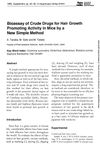 12 citations,
January 2010 in “European Journal of Dermatology”
12 citations,
January 2010 in “European Journal of Dermatology” Norgalanthamine from Crinum asiaticum may help hair grow.
 5 citations,
December 2018 in “Biological & Pharmaceutical Bulletin”
5 citations,
December 2018 in “Biological & Pharmaceutical Bulletin” Norgalanthamine helps hair cells grow by activating certain pathways related to hair growth.
 41 citations,
September 2011 in “Journal of Ethnopharmacology”
41 citations,
September 2011 in “Journal of Ethnopharmacology” Panax ginseng extract helps mice grow hair.

Crinum asiaticum extract and norgalanthamine may promote hair growth by blocking an enzyme linked to hair loss and a pathway that stops hair growth.
 41 citations,
July 2015 in “Current Drug Discovery Technologies”
41 citations,
July 2015 in “Current Drug Discovery Technologies” Some plants may help with hair growth and have fewer side effects than synthetic drugs, but more research is needed to confirm their effectiveness.
January 2020 in “Indian Journal of Pharmaceutical Sciences” Natural products show promise for new hair loss treatments.
 January 2020 in “Elsevier eBooks”
January 2020 in “Elsevier eBooks” Plant-based chemicals may help hair growth and prevent hair loss but need more research to compete with current treatments.
 16 citations,
January 1980 in “Planta Medica”
16 citations,
January 1980 in “Planta Medica” Some natural extracts and one hair tonic can promote hair growth in mice.
 76 citations,
August 2018 in “International Journal of Cosmetic Science”
76 citations,
August 2018 in “International Journal of Cosmetic Science” Dermal Papilla cells are a promising tool for evaluating hair growth treatments.
 8 citations,
April 2020 in “Journal of Ethnopharmacology”
8 citations,
April 2020 in “Journal of Ethnopharmacology” Herbs might help with hair loss, but more research is needed to confirm their safety and effectiveness.

Plant-based compounds can improve wound dressings and skin medication delivery.
 1 citations,
January 2017 in “Social Science Research Network”
1 citations,
January 2017 in “Social Science Research Network” The document suggests creating a secure database for indigenous knowledge and recommends that the TKDL actively fight patents that slightly alter traditional knowledge.
 17 citations,
February 2015 in “Phytochemistry Reviews”
17 citations,
February 2015 in “Phytochemistry Reviews” Southeast Asian herbs show promise for skin and hair care, but more research is needed to confirm their effectiveness in cosmetics.
 170 citations,
September 2019 in “Evidence-based Complementary and Alternative Medicine”
170 citations,
September 2019 in “Evidence-based Complementary and Alternative Medicine” Some medicinal plants can help heal wounds and may lead to new treatments.

Certain natural products may help stimulate hair growth by affecting stem cell activity in the scalp.
 7 citations,
January 2022 in “Plants”
7 citations,
January 2022 in “Plants” Rice husk and bran extracts from the Bue Bang 3 CMU variety can potentially treat hair loss due to their antioxidant, anti-inflammatory, and anti-androgenic properties.
 2 citations,
January 2023 in “Pharmaceuticals”
2 citations,
January 2023 in “Pharmaceuticals” Natural products and phytochemicals may help with hair regrowth, but more research is needed.
 January 2023 in “International Journal of Molecular Sciences”
January 2023 in “International Journal of Molecular Sciences” Maxillariinae orchids contain 62 compounds with potential health benefits, including treating skin conditions and diseases like cancer and diabetes.
 3 citations,
April 2016 in “Food Science and Biotechnology”
3 citations,
April 2016 in “Food Science and Biotechnology” Oriental melon leaf extract may help hair grow and keep it in the growing phase longer.
 16 citations,
September 2018 in “Journal of Ethnopharmacology”
16 citations,
September 2018 in “Journal of Ethnopharmacology” Plant-based remedies may treat hair loss by reducing inflammation and improving insulin resistance.
 December 2018 in “Esperienze dermatologiche”
December 2018 in “Esperienze dermatologiche” A lotion with Centella asiatica extract reduced hair loss by 41% and increased hair strength without side effects.
34 citations,
January 2022 in “Molecules/Molecules online/Molecules annual” Natural ingredients in cosmeceuticals are beneficial for skin and hair health with few side effects.
 17 citations,
April 2015 in “Tropical Journal of Pharmaceutical Research”
17 citations,
April 2015 in “Tropical Journal of Pharmaceutical Research” Asiasari Radix et Rhizoma is safe and has potential for new drug development due to its therapeutic properties.
 139 citations,
October 1999 in “Environmental Health Perspectives”
139 citations,
October 1999 in “Environmental Health Perspectives” Modern science supports the use of some Ayurvedic plants for health, as ancient practices suggested.
 23 citations,
March 2019 in “Environmental Chemistry Letters”
23 citations,
March 2019 in “Environmental Chemistry Letters” Cyclodextrins improve how steroid drugs work and are used in marketed medications and environmental applications.
 1 citations,
December 2013 in “Turkderm”
1 citations,
December 2013 in “Turkderm” Use of cosmeceuticals during pregnancy and breastfeeding is not recommended due to insufficient safety data.
 44 citations,
August 2012 in “Journal of Food Science”
44 citations,
August 2012 in “Journal of Food Science” The best way to extract saponins from Eclipta prostrasta is using 70% ethanol, at 70°C for 3 hours with a 14:1 liquid to solid ratio.
 23 citations,
July 2018 in “BMC Complementary and Alternative Medicine”
23 citations,
July 2018 in “BMC Complementary and Alternative Medicine” Certain herbal combinations in traditional Chinese medicine might be effective for treating hair loss, focusing on liver or stomach health.
 June 2023 in “MPI (Media Pharmaceutica Indonesiana)”
June 2023 in “MPI (Media Pharmaceutica Indonesiana)” A hair tonic made from kale leaves is effective for hair growth and meets Indonesian standards.
 57 citations,
October 2021 in “Journal of ethnopharmacology”
57 citations,
October 2021 in “Journal of ethnopharmacology” Indian herbal medicine shows promise for treating skin diseases but needs more research to prove effectiveness.




























